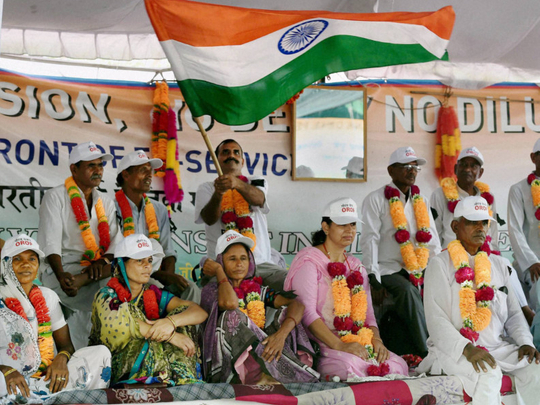
An acronym and an Arabic word have come to ruin Modi’s achhe din (good days). OROP stands for one rank, one pension and Jumla, the offending word with its Arabic roots refers to making empty promises. Achhe din is in itself the perfect example of one such banal utterance; with due apology to that timeless classic Great Expectations.
How has this come about in a mere 17 months? For India had at long last put into office a powerful prime minister with a strong mandate and a proven ability to get things done. He may yet deliver, but time is running out and dithering on OROP is like sitting on a ticking time bomb. The military is the nation’s sword arm and one does not trifle with it. Terrorism, internal insurgency, talks with Pakistan and many other critical issues can wait, disaffection within the military, the nation’s last resort, cannot. It is a clear and present danger.
OROP stipulates the same pension for the same rank and for the same length of service irrespective of retirement date and its implementation should have been a no-brainer. It is perplexing that a government that draws on military veterans’ support should be so ham-handed; the arresting visuals of veterans being pushed around by the local police in Delhi was bad optics. Incidentally, OROP was the first of the many promises Modi made on his campaign trail. In Raiwind, Haryana, he thundered with all the theatrical flourishes at his command that he would make good on this promise when he became prime minister.
Why then is an allegedly decisive prime minister vacillating? Either he should confess he overpromised or he should tell his civil bureaucracy to get it done irrespective of the maths. Indeed there are such wildly differing figures being put out that the layman is confused. One commentator said if OROP was to be implemented, India would in effect be maintaining two armies, two navies and two air forces. The total payout on pensions would balloon to Rs750 billion (Dh41.65 billion) and this amounts to almost 80 per cent of the salary bill of Rs932 billion currently incurred by the Defence Ministry for the military.
So it is important to get the maths right. For broadly while there are three strands of arguments against OROP, that old chestnut, ‘it is the economy, stupid’ is singularly compelling. The trickle–down effect, the consequent impact of OROP on other services, specifically the para military forces, is the other reason advanced by those opposed to OROP. The last is the equitability argument pushed very eloquently by an ex-bureaucrat, Avay Shukla. As a civil services officer, he does take a slightly prejudiced line, but much of what he says makes sense.
Equitability principle
As for the maths, the figure of Rs85 billion has been touted around as the add-on cost for OROP, but some others have put it up at Rs200 billion and notwithstanding the widely differing amounts, the cascading effect, if the other para military forces also demand OROP, becomes truly backbreaking. However, the most disturbing argument against OROP is when we are confronted with his equitability principle.
Some years ago, the civil services — specifically the Indian Administrative Service (IAS) — stealthily awarded to itself OROP and co-opted a select few of the top echelons of the military and the judiciary to avail of this special provision as well. A clever and iniquitous step and which hides a very crucial difference between the IAS and the military. For, unlike the military, where only a miniscule proportion reaches the rank of a lieutenant general or its equivalent to take advantage of OROP, most of these civil servants almost automatically qualify for this privilege when they retire. This was a crafty move for it dulled the opposition from the military and when some of the non-IAS services top jobs were also included in OROP, the civil services virtually got away with this sleight of hand — a heist in criminal parlance!
These are, however, minor quibbles. The central point in this debate is that the military stands well apart from all other services. This is acknowledged by all, the nation, the average citizen and even the much reviled political class. Why else does one see the military stepping in to quell internal civil disorder when the police fail? They are universally respected and the public accord them the highest honour for their unique contributions. OROP is more than just pensions, it is about patriotism, dedication, duty before oneself and sacrifice. Having said that, the military must also accept that its top echelons have let it down. Why indeed did it allow the civil services to get away with that heist? Its top brass needs to come clean.
Today, a commemorative ceremony will mark the 50th anniversary of India’s 1965 war against Pakistan. Perhaps Modi may surprise the nation with a gift that is long due.
Ravi Menon is a Dubai-based writer, working on a series of essays on India and on a public service initiative called India Talks.









